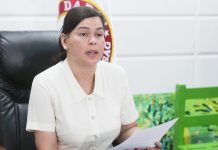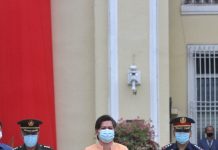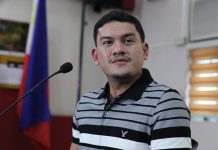THE Ecumenical Bishops Forum is upbeat over the peace process being undertaken by the Philippine government (GPH) and the National Democratic Front (NDF).
“We are happy at this development, but we would also equally express the sentiment that both parties should exert all efforts to remain at the negotiating table and not allow the peace process to be stalled again over contentious issues and concentrate instead on the root causes of the conflict.”
Peace is not merely the absence of hostilities and conflict, the bishops said, but more positively includes the concept of wholeness and people’s well-being. They reiterated the scriptural affirmation that true and lasting peace is based on the foundation of justice.
Revitalizing their peacemaking ministry, the United Church of Christ in the Philippines (UCCP), one of the convenors of “Sowing the Seeds of Peace”, the Mindanao Movement for a Just and Lasting Peace, said that seriously engaging in the peace talks is imperative.
Peace talks, the UCCP said, are intended to create conditions that will bring about peace, thus they will participate in the establishment of a meaningful and just social order as they commit in their Statement of Faith as Church people.
The UCCP said that peacemaking calls them to education and advocacy; prayerful discernment and vigilance; and, active obedience to God. “As the peace talks proceed, we must be vigilant against machinations that disguise foreign intervention, intelligence operations, or militarization as peace building.
“But, let us also give our fullest efforts in grasping the current openness to build roads of peace based on justice that can benefit the Filipino people who long for an abundant life and a just and lasting peace.”
Further, various sectors and groups in Mindanao endorse the Mindanao People’s Peace Agenda in addressing the roots of the armed conflict and work for the attainment of peace based on social justice.
In their manifesto, the following words of the late Jose W. Diokno, human rights advocate and nationalist, were quoted: “Peace means jobs, and justice, food and freedom.”
The Mindanao groups commit to continue supporting the GPH-NDFP peace talks, the subsequent operation of reciprocal working committees, the revitalization of the Joint Monitoring Committee on Human Rights, and the sequential tackling of the substantive agenda from the Comprehensive Agreement on Social and Economic Reforms, Political and Constitutional Reforms, and End of Hostilities and Disposition of Forces. [Lorie Ann A. Cascaro]
They pledged to undertake thorough-going education on peace based on justice and the peace talks among their various constituencies in schools, churches, and communities; to promote sectoral, multi-sectoral, ecumenical, and interfaith initiatives to support the GPH-NDFP peace talks;
To continue providing venues for the GPH and NDFP peace panels to present post-session reports to the people of Mindanao; and, to initiate other necessary undertakings and activities as a movement to help the GPH and NDFP peace talks move forward to a higher level in the substantive agenda.
Updates on peace talks
While they are now discussing the root cause of the armed conflict, there remain differences in perspectives. This was the update shed by representatives of the panels negotiating in the peace talks between the GPH and NDFP at a forum held in Davao City last April 12.
The forum was organized by the “Sowing the Seeds of Peace,” together with the Exodus for Justice and Peace (EJP). It was attended by peace advocates, members of religious groups, academe, lawyers, professionals and business sector groups. The GPH panel was represented by Ednar Dayanghirang, and the NDFP, by Fidel V. Agcaoili.
Local government officials and their representatives were also present. Davao City Mayor Sara Duterte, who gave the opening remarks, thanked the organizers and said that Davao City shall remain supportive of initiatives for peace. The gathering, she pointed out, is a good way to keep the people updated on whatever agreements both panels try to forge.
Among the other government officials present were Gov. Lala Talino-Mendoza of North Cotabato, representatives from the office of Davao del Norte governor Rodolfo del Rosario, lawyer Reynaldo Castillo, the vice-mayor of Compostela (Compostela Valley), village officials of gold-rich Mt. Diwata in Monkayo ComVal), as well as village officials from North Cotabato and Davao City.
Bishop Modesto Villasanta Jr. of the UCCP said the forum was a good chance for everyone to understand the root causes of, and solutions to, the problems, and how they can take part to achieve it.
“Talking peace is a good chance for people to unite to create a genuine peace, one that is based on justice and freedom from oppression. It is our wish that whatever agreement both sides come to will touch the dreams and aspirations of our people,” Villasanta said.
The Sowing the Seeds of Peace has launched various activities parallel to the weeklong peace negotiations in Oslo, Norway. It spearheaded succeeding gatherings to rally support behind the talks in the belief that it is the people who will stand to benefit most from a successful peace negotiation.






